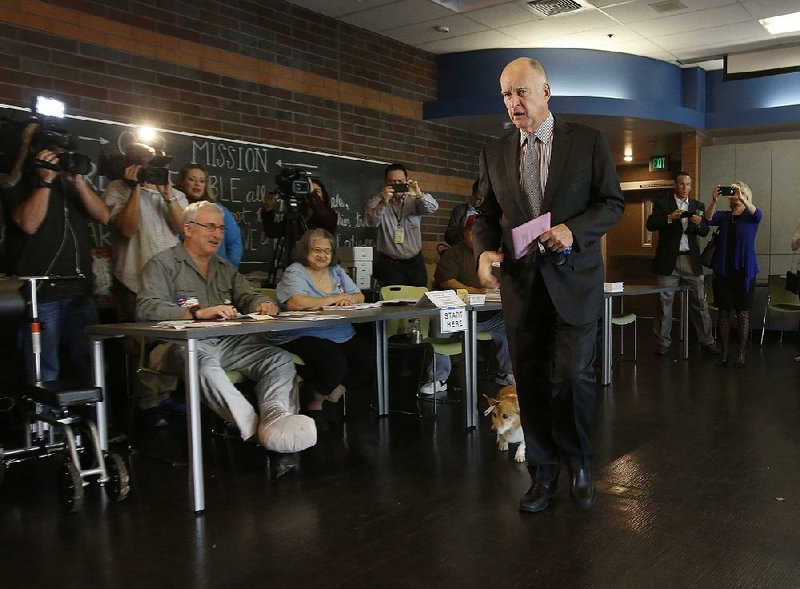NEW YORK -- Voters in some states weighed in Tuesday on several of most volatile subjects facing America -- gun control, the death penalty and the right of a terminally ill person to get a doctor's help in dying.

In Nebraska, voters reinstated the death penalty, reversing the Legislature's decision last year to repeal capital punishment. Nebraska has not executed an inmate since 1997; 10 men currently sit on death row.
Colorado voters approved a measure that will allow physicians to assist a terminally ill person in dying. That's already a practice in five other states. Coloradans defeated a proposal that would have set up the nation's first universal health care system.
In all, there were more than 150 measures appearing on statewide ballots. California led the pack with 17 ballot questions, including one that would require actors in porn movies to wear condoms during filming of sexual intercourse. Another would ban single-use plastic grocery bags.
Gun control was on the ballot in four states, including California, which already has some of the nation's toughest gun-related laws. Proposition 63 would outlaw possession of large-capacity ammunition magazines, require permits to buy ammunition and extend California's program that allows authorities to seize firearms from owners who bought guns legally but are no longer allowed to own them.
In Maine and Nevada, a group founded by former New York City Mayor Michael Bloomberg spent millions promoting ballot measures that would require background checks on nearly all gun sales and transfers. Supporters say the changes would close gaps in the federal system that allow felons, domestic abusers and the mentally ill to buy firearms from private sellers at gun shows and online without a background check.
Washington state had a ballot measure that would allow judges to issue orders temporarily seizing guns from individuals who are deemed a threat.
Nebraska was one of three states voting on capital punishment. California had two competing measures on its ballot, one repealing its rarely used death penalty and the other speeding up appeals so convicted murderers are actually executed.
Oklahoma residents approved a measure to make it harder to abolish capital punishment. It seeks to ensure the state has a way to execute prisoners even if a given method is blocked.
Two pro-death-penalty legislators in Oklahoma developed the ballot measure after a pair of botched executions in 2014 and 2015. One inmate struggled against his restraints as he died and the other was given a drug not listed in the state's execution protocol.
Opponents said the amendment wasn't necessary because the death penalty is already legal in Oklahoma.
California had two competing capital-punishment measures on its ballot. One would repeal the death penalty, which California has rarely used in recent decades. The other would speed up appeals so convicted murderers are actually executed.
In Nebraska, voters were deciding whether to reinstate the death penalty, which the Legislature repealed last year.
Among the other topics addressed by ballot measures:
• Arizona and Colorado approved measures phasing in a $12 minimum hourly wages by 2020. Maine voters appeared likely to approve a similar measure. In Washington state, where the minimum wage is $9.47 an hour, voters considered raising that to $13.50 an hour by 2020. The federal minimum wage is $7.25 an hour.
• There were mixed verdicts on casino expansion. New Jersey voters rejected a measure that would have allowed casinos outside Atlantic City for the first time in the state's 38-year history of legalized gambling. Rhode Island voters approved a measure to build a new casino in Tiverton, on the Massachusetts border.
• Coloradans voted on a proposal to set up the nation's first universal health care system. The measure would set up a $25 billion-a-year health care system funded by payroll taxes, replacing the system of paying private health insurers for care and opting out of the federal health care law.
• Maine voters were deciding whether to approve a 3 percent tax on people earning more than $200,000 a year to support an education fund for teachers and students. An Oregon measure would impose a 2.5 percent tax on corporate sales that exceed $25 million -- with revenue earmarked for education, health and senior citizen services. An initiative in Washington state sought to promote cleaner energy by imposing a tax of $25 per metric ton on carbon emissions from fossil fuels such as gasoline, coal and natural gas.
• Votes in four states -- California, Colorado, Missouri and North Dakota -- were deciding whether to raise taxes on cigarettes and other tobacco products.
A Section on 11/09/2016

